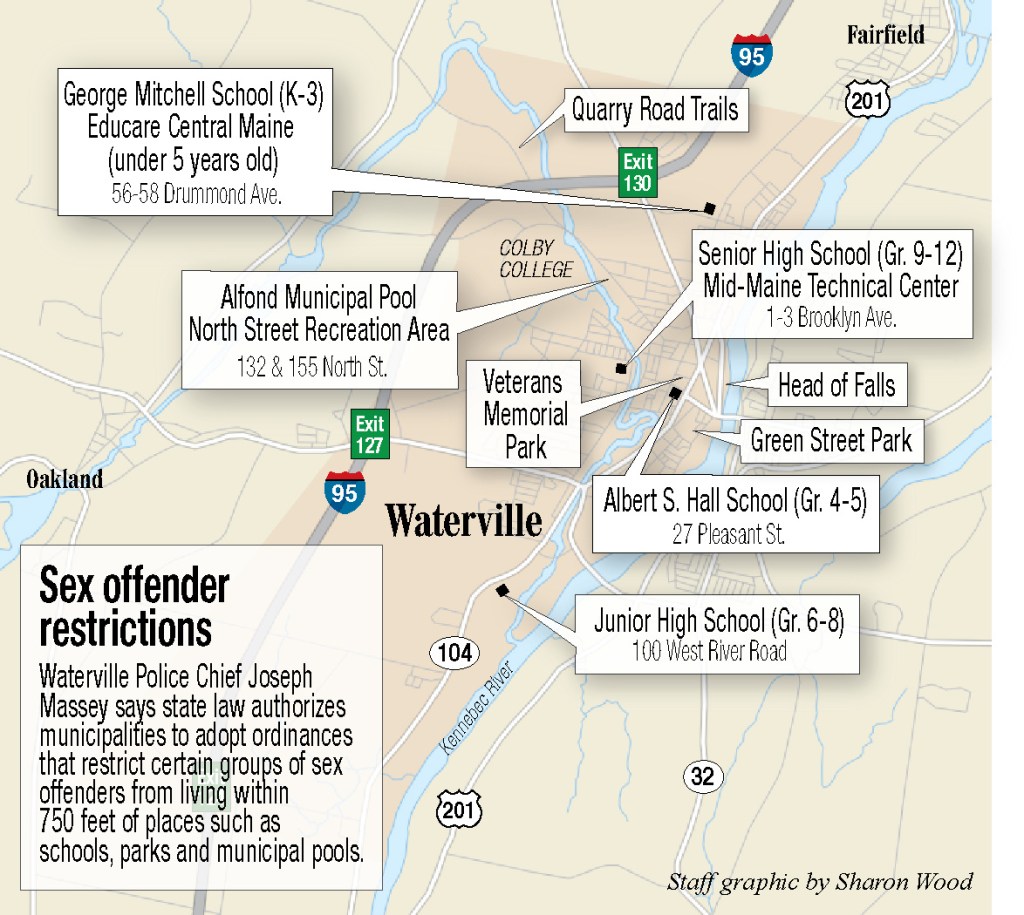WATERVILLE — Andrew Ayers is frightened for his daughter when he looks out his window and sees a registered sex offender walking past Albert S. Hall School against his probation restrictions.
As a teacher, Ayers hears from female students about how frightened they are of sex offenders in their neighborhoods.
When he checked the law regarding sex offenders, he learned that Waterville could adopt an ordinance prohibiting some sex offenders from being within 750 feet of places frequented by children such as schools, parks and playgrounds.
On Feb. 6, Ayers stood before the City Council and urged councilors to consider developing such an ordinance.
“I don’t think this would be an administrative burden on the city,” he said.
He told the council that other municipalities, including Biddeford and Falmouth, have enacted ordinances, and he thinks it shows that residents want such restrictions. He said he understands there are arguments against it, including one that says 93 percent of victims of sex crimes know their perpetrators.
“But I would say, what about the other 7 percent?” he said.
Mayor Nick Isgro backed Ayers’ recommendation to have an ordinance and thanked him for speaking up.
“I think it’s a good idea, by the way,” Isgro said. Enacting an ordinance would send a message that sex offenders are not wanted in the city, he said.
OFFENDER RESTRICTIONS LIMITED
Police Chief Joseph Massey said state law authorizes municipalities to adopt ordinances that restrict certain groups of sex offenders from living within 750 feet of places such as schools, parks and municipal pools, if they have been convicted of a Class A, B or C sex offense against someone who has not reached the age of 14 at the time of the offense.
“It’s not all sex offenders,” he said. “If the crime is against a 16-year-old, restrictions don’t apply, so they could live within 750 feet.”
Also, sex offenders living within 750 feet of places frequented by children before an ordinance is enacted would not be affected, Massey said.
No one had proposed such an ordinance for Waterville before Ayers’ request to the City Council, Massey said. He said he has no issues with the idea of enacting an ordinance and he does not think it would place a burden on the police department.
City Manager Michael Roy said that, in his 13 years working for the city, he does not remember anyone specifically asking that an ordinance be enacted.
“We have had people suggest that we adopt restrictions, but those suggestions were never able to be supported by law – meaning that they wouldn’t pass constitutional muster,” Roy said.
Not everyone views an ordinance as necessarily the best course.
Rachel Healy, director of communications and public education for the American Civil Liberties Union of Maine, based in Portland, said the organization is not familiar with Waterville’s efforts to consider enacting an ordinance but she spoke about such ordinances in general.
“Generally speaking, while well-intentioned, restrictions on where former offenders can live aren’t based on data and don’t make anyone safer,” she said. “Instead, they drive former offenders into the shadows and further away from their support systems. They also ignore the fact that most offenses are committed by family members or acquaintances of the victims, not strangers. A better way to keep our kids safe is to focus on getting former offenders the rehabilitative services they need.”
AUGUSTA ALREADY HAS ORDINANCE
There are 46 registered sex offenders in Waterville, according to Massey, who said they live in various parts of the city. Some are on probation and may have specific restrictions because of that, he said.
In the city of 15,700 residents living within 13 square miles, there is one sex offender for every 341 people, or about 3.5 sex offenders in each square mile, Massey said.
When a sex offender moves into a neighborhood, police go door-to-door in that neighborhood to distribute fliers that notify residents of the sex offender, his address and his crime.
The city of Augusta has a sex offender ordinance, and the police department there has a website that lists the streets that a sex offender is prohibited from living on, he said. If Waterville were to enact an ordinance, police would advise newly registered sex offenders who committed crimes against people 14 and younger about areas they are prohibited from living in, Massey said.
Augusta Police Chief Robert Gregoire said in an email that Augusta enacted a sex offender ordinance in 2013 and that the request to adopt an ordinance came from the public.
Asked if sex offenders tend to re-offend, Massey said some have done so in Waterville over the years, but most violations are either that they do not register when they move to a new address, as required, or do not abide by probation restrictions, such as to not have contact with a child under the age of 15 or 16.
“We’re pretty familiar with many sex offenders, and I think we do a pretty good job recognizing them and knowing where they live and doing what we can to do additional oversight, given all the other challenges we face,” Massey said.
He noted that many sex offenders live in areas where resources are available, including courts, probation offices, mental health counseling and alcohol and drug counseling.
On Feb. 7, police received a report of a registered sex offender, Cory Kibbe, walking near Albert S. Hall School at the corner of Pleasant and School streets. Kibbe, who is prohibited from being near the school, was arrested on a probation violation, according to police records.
POSSIBLE COUNCIL VOTE NEXT MONTH
Ayers, the man who asked city councilors to consider adopting a sex offender ordinance, asked Councilor Nathaniel White, D-Ward 2, if he would sponsor such a proposed ordinance.
White said he would.
“I think Andrew has a very good point where we have a lot of schools in Waterville and we want to keep our kids safe,” White said recently.
“This ordinance should have been established in Waterville as soon as the state gave the towns and cities permission to enforce this,” White said. “With the revitalization of Waterville, I think this is important to establish within the city of Waterville. Of all the local neighborhood amenities that can influence the decision to purchase a home, good-quality schools is one of the most influential as parents are looking for a safe environment for their children. Establishing this ordinance in the city of Waterville will show that we as a city strive to create a safe environment for citizens to live and raise a family.”
Roy said Friday that the City Council will discuss a potential sex offender ordinance for Waterville on Tuesday and that officials will look at crafting an ordinance based on those enacted in other communities. No vote will be taken Tuesday, but it’s possible that councilors will take a first vote March 6 on a proposed ordinance, Roy said.
Ayers said he has taught in Waterville for 17 years, but lived in Vassalboro before he and his family moved to Waterville 1½ years ago.
“We are excited about revitalization and wanted to live downtown,” he said.
Recently, he noticed police fliers in his neighborhood notifying residents that a registered sex offender who had committed gross sexual assault against a child under 14 was living in the area right across from a school.
Ayers cited a list of municipalities that have enacted sex offender ordinances, including Bangor and Augusta, and said Waterville should do the same.
Amy Calder can be contacted at 861-9247 or at:
acalder@centralmaine.com
Send questions/comments to the editors.





Success. Please wait for the page to reload. If the page does not reload within 5 seconds, please refresh the page.
Enter your email and password to access comments.
Hi, to comment on stories you must . This profile is in addition to your subscription and website login.
Already have a commenting profile? .
Invalid username/password.
Please check your email to confirm and complete your registration.
Only subscribers are eligible to post comments. Please subscribe or login first for digital access. Here’s why.
Use the form below to reset your password. When you've submitted your account email, we will send an email with a reset code.